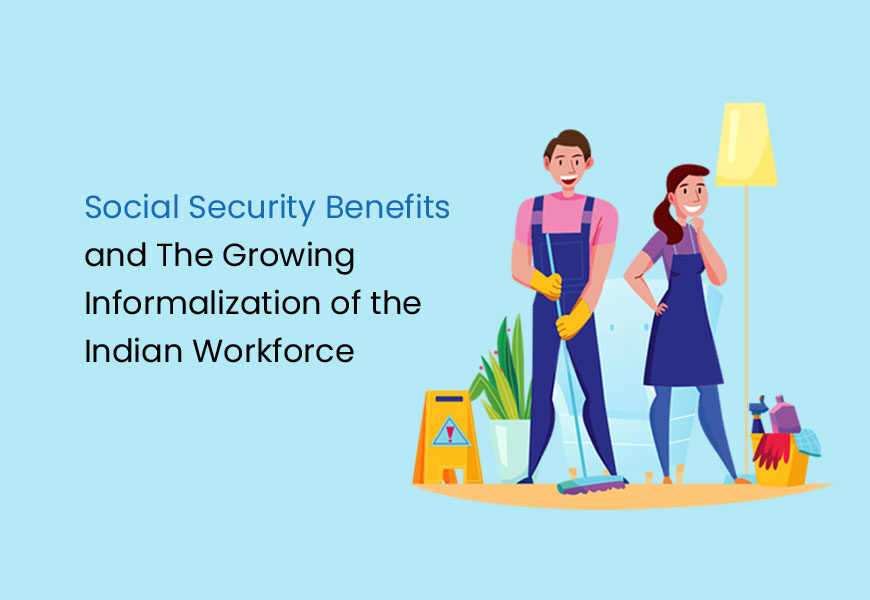More than 90% of India’s workforce is employed in the informal sector, working without minimum wages, social insurance or decent work conditions. In absolute numbers, close to 400 million Indians work in the informal/ unorganized sector as casual, platform or gig workers.
According to an ILO study, 85% of all non-agricultural employment is informal in the country. This figure has almost remained stagnant over the past two decades. But non-farm, informal jobs in the organized sector have grown from 32% in 1999-2000 to 60.4% in 2011-12. The bottom line is that more jobs are getting informalized.
What does this growing informalization of the workforce mean? Why is it a problem? Is providing social security a way forward in formalizing the workforce or at least ushering decent work for the many informal workers of the country? Keep reading to find out.
The Growing Informalization of the Workforce
What is Informalization of the Workforce?
The workforce composition is divided into formal or organized and informal or unorganized sectors. The formal or organized sector is where workers have fixed and guaranteed wages, specific working hours, social security benefits and so on. The sector must follow all regulatory frameworks and government guidelines with respect to work conditions, worker safety, etc. Workers have the rights and opportunities to unionize to protect their rights and interests.
Informal or unorganized sector is where workers do not have fixed working hours, guaranteed monthly wages or social security benefits. The informal sector lack proper regulations or government guidelines to protect workers’ safety and interests. Typically, workers in the informal sector have the flexibility to work with different employers at the same time.
Informalization is the situation where over a given period of time the total percentage of informal workers increases in the total workforce.
In the period post liberalization, we have seen an increasing incidence of informalization of the workforce. According to one study, 61 million jobs were created in roughly 2 decades post-liberalization of the economy in the early 1990s and 92% out of those were informal jobs.
What Factors are Responsible for the Growing Informalization of the Workforce?
Globally, 61% of the workforce works in the informal economy. Emerging and developing economies contribute 93% to the global informal employment figures. One of the key factors influencing the level of informal employment is the level of education. In countries where the levels of illiteracy are high and educational attainment is low, the informalization of the workforce is higher. Globally, when the level of secondary and tertiary education increases, the level of informality increases.
Globalization is another major reason for the increasing workforce informalization in India. Globalization brings in stiff, cut-throat competition from across different countries. Local manufacturers and service providers must minimize cost of production to match the low prices offered by international competitors.
So, local manufacturers end up hiring contract and casual workers who aren’t paid benefits or social insurance. These workers end up working longer hours for lower than market rates. The sweat shops in the apparels industry are such an example.
The other implication of globalization is the rise in urbanization and migration. Owing to an array of push and pull factors, more people are moving to cities and towns in search of better employment opportunities. These workers are absorbed by the informal economy. In addition to gig work and casual labour, there is also a significant increase in the domestic workers in the urban areas.
Increasing competition and market mechanisms have also led to the closure of textile mills, factories and other traditional labour intensive industries, making way for newer, capital-intensive, tech-led industries. This has led to a reduction of formal employment. The global recession in late 2000s, the recent global pandemic and other force majeure events have further led formal jobs to shrink.
In recent years, the growing popularity of e-commerce platforms like Amazon, Zomato and Swiggy have led to a massive surge in platform workers. There has also been an increase in gig work such as freelancing, outsourced odd jobs, etc. In the absence of formal jobs, even college graduates are taking up platform and gig work.
Why Is Informalization of The Workforce A Problem?
Informal jobs, especially gig work for skilled workers, have their benefits. They offer flexibility to workers to choose their employers and work based on the best value offered, without being bound by long-term contracts. The barriers to entry are fewer and exit is relatively easier. The informal economy, especially for skilled workers, has dynamic potential.
However, increasing informalization has multiple adverse consequences for not just the workers but the society and economy itself. That is why, we should not ignore the problems posed by increasing informalization.
So, what are these problems?
Informal sector workers don’t have fixed, guaranteed wages or a regular flow of income. With a lack of proper regulatory guidelines on remuneration, informal workers are often exploited. It is not a secret that there is a significant wage difference between contract workers and regular/ directly employed workers. They don’t have access to social security benefits that are available to regular workers such as:
- EPF (Retirement benefits)
- Health insurance
- Disability benefits
- Provisions of the Workmen’s Compensation Act
- Maternity benefits
- Life insurance
For instance, many garment companies hire informal workers and pay them in piece rate to minimize their costs. If they hire more regular employees for their factory, they will have to abide by the laws with respect to renumeration, social security, benefits and work safety. Piece workers, on the other hand, just get the piece rate for approved garments. They don’t have any social security benefits or perks. They are responsible for their safety and insurance.
Without any social security benefits or social insurance, informal workers are faced with increased out of pocket expenses for healthcare, education and so on. The lack of social security benefits deepens their poverty and equities. They may not be able to send their children to secondary school and college. They will not have any savings or insurance to help them in contingency situations.
Since a vast majority of the informal workforce is women, we will also have a large proportion of elderly women in poverty as they will neither have savings or pensions. So, increasing informalization also means that many elderly women will be forced to continue engaging in hard manual labour to make ends meet even as they age.
Informalization of the workforce creates financial instability and job insecurity for a vast majority of workers in the country. A sudden medical expense, economic downturns, natural disasters or even black swan events like Covid will push them further into poverty.
The increasing informalization of the workforce also means most workers have poor working conditions and work-life balance. This will have an impact on their productivity, health and well-being.
How Do Social Security Benefits Help?
Policy changes, governmental action and widespread skill building are must to make a long-term impact on the lives of informal workers. An immediate measure that can help formalize the vast majority of informal workers of the country is by providing social security benefits.
Social security benefits help formalize the workforce without hampering the dynamism of informal and gig work. So, gig workers will still have the flexibility to work with different employers at the same time or quickly shift jobs, but without the financial insecurity and instability.
When social security benefits are accessible to informal workers, they will have access to healthcare, insurance and retirement benefits. This instantly provides them a safety net and reduces their out-of-pocket expenses. They can divert their income to more valuable pursuits like skilling their children, sending their children to secondary school and college, saving for retirement and so on. They will be better equipped to face contingency and force majeure events like the covid pandemic, natural disasters and so on.
By providing social security benefits, employers can show informal workers that they care for them and build trusting, long-term relationships. This way, informal workers will have affinity towards the employer. This boosts their productivity and output. There is also lower absenteeism and employee attrition.
Conclusion
Providing social security is highly valuable to not just the employers but the economy itself. In a way, it helps to formalize the informal sector and create financial stability for the wide range of informal workers in the country.
At TankhaPay, we understand the criticality of social security benefits and help employers provide these benefits to their employees including domestic workers, full-time home staff, drivers, casual workers gig workers and so on.
Download the TankhaPay app now













